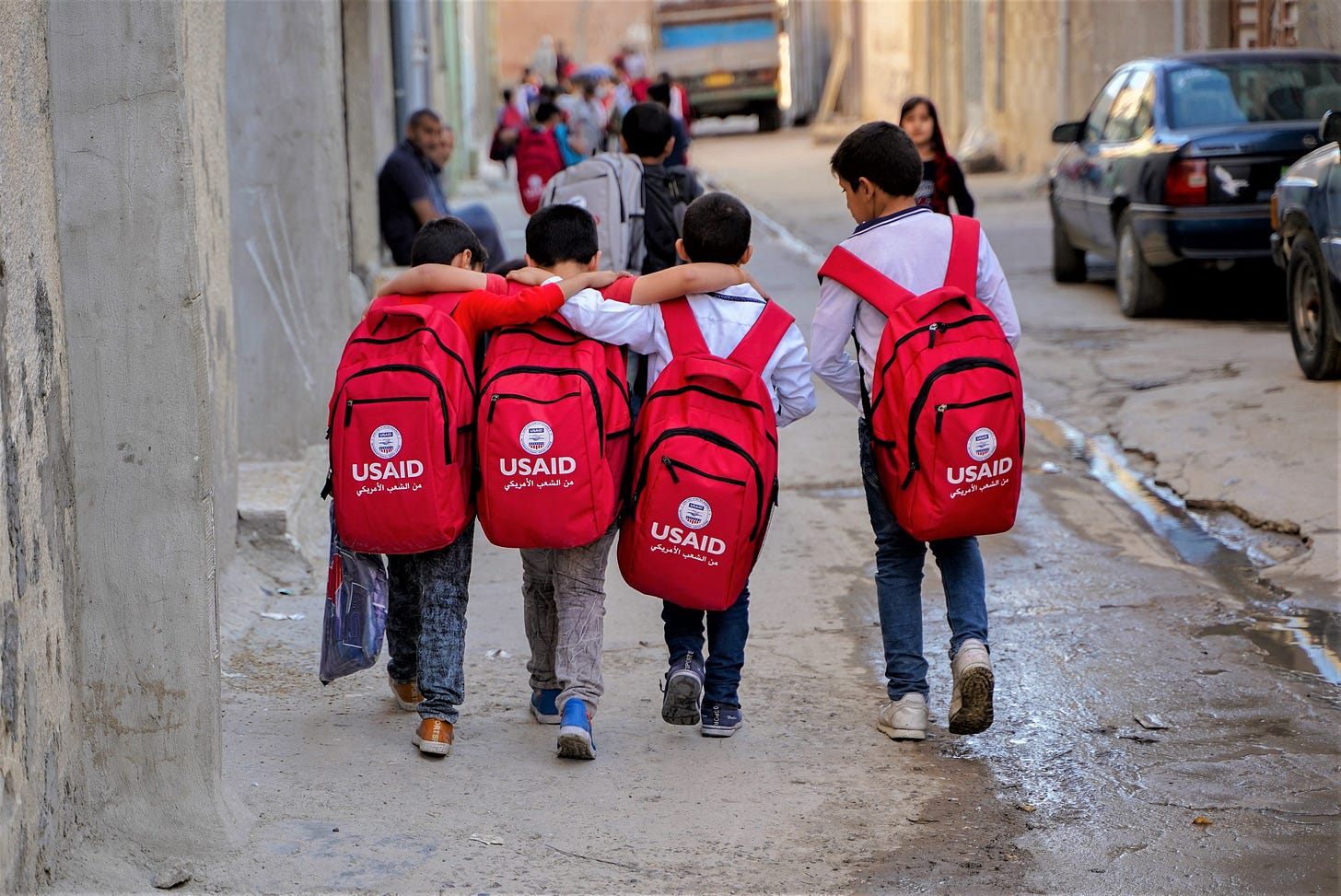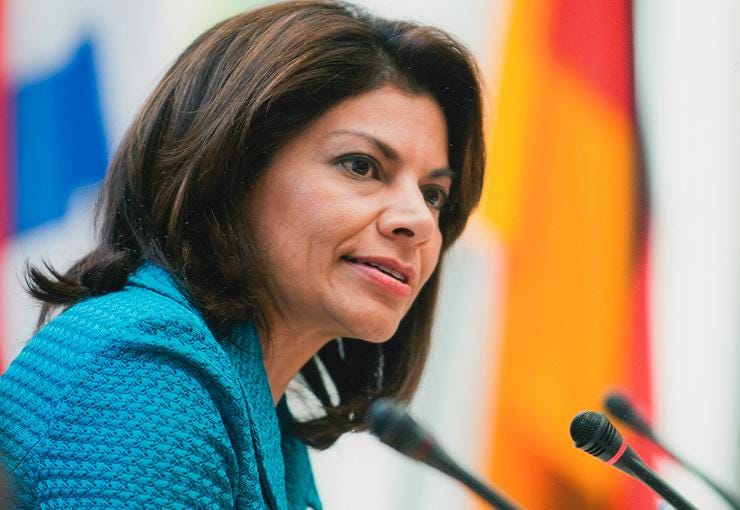Foreign Service Nationals: The Oft-Forgotten Backbone of USAID
They’ve Devoted Their Lives to USAID. Now, America is Turning Its Back on Them.

In the past weeks and months, much of the public conversation has centered on our American colleagues at USAID—their livelihoods, their futures, and how this attempted illegal dismantling of USAID affects American employees. And make no mistake, that impact is catastrophic. But throughout this turmoil, another group has been left in the shadows: our Foreign Service National (FSN) colleagues.
FSNs are more than support staff. They are the institutional memory and trusted experts who make U.S. foreign assistance possible. They are our colleagues, neighbors, and friends. They bring firsthand knowledge of the communities we serve, ensuring that American aid is effective and responsive.
Yet as USAID faces destruction, many everyday Americans don’t even realize they exist.
While Foreign Service Officers have been unwillingly furloughed, FSNs remain at their desks, ensuring that critical American policies and programs continue—often without support or acknowledgment from Washington. They show up every day with faithfulness and integrity, holding together essential initiatives, even as their own futures hang in limbo.
The U.S. government may be stalled, but they are still working. The question is: Will we fight for them the way they have fought for us?
Essential Implementors of American Foreign Aid
FSNs are not just support staff. They design, manage, and oversee critical U.S. foreign assistance programs in conflict zones, fragile democracies, and authoritarian states. They ensure that American taxpayer dollars are spent effectively, protecting funds from corrupt regimes.
Their expertise spans across sectors:
Governance & Democracy: Strengthening free media, fighting corruption, and safeguarding elections—often at great personal risk.
Public Health: Implementing HIV prevention, maternal health, and vaccine initiatives that have saved millions of lives.
Crisis Response: Maintaining aid programs when American staff are forced to evacuate.
Education: Expanding access to schooling, training teachers, and ensuring marginalized communities have opportunities to learn.
Business & Economic Development: Supporting small businesses, entrepreneurship, and sustainable economic growth that lifts entire communities out of poverty and provides stable trading partners for America.
Climate & Environment: Leading initiatives on clean energy and disaster resilience to protect vulnerable populations from environmental crises.
Unlike USAID Foreign Service Officers who rotate every few years, FSNs provide continuity, preserving institutional knowledge that keeps USAID effective.

From FSNs to National Leaders
FSNs are not just development workers—they are future national leaders:
The first female president of Costa Rica worked as a USAID FSN and earned a master’s degree through a USAID scholarship.
Alejandro Toledo, Peru’s first Quechua-speaking president, pursued a Ph.D. while his wife worked as a USAID FSN.
Former FSNs in Macedonia have been elected to Parliament, crediting USAID for preparing them for public service.
They are not bureaucrats. They are the quiet architects of democracy and progress.
They Operate in the Most Dangerous Places—When No One Else Can
FSNs take on risks most Americans never see:
In authoritarian states, they face surveillance, harassment, and interrogation for their U.S. affiliations.
In failing states, they keep USAID programs running when American staff must leave.
In conflict zones, their work can make them targets for repressive governments.
We have seen this before. When Kabul fell in 2021, Afghan interpreters and aid workers who had risked their lives for the U.S. were left scrambling for safety. FSNs worldwide now watch in silence, knowing they could be next.
A Humanitarian Crisis Washington Ignores
FSNs are not just losing jobs—they are losing security, livelihoods, and protection.
Economic Fallout: FSNs in low-income countries will be plunged into poverty overnight.
Political Retaliation: In authoritarian regimes, FSNs may be blacklisted, unemployable, or even targeted.
Loss of Stability: The end of USAID programs means entire communities will suffer—education, healthcare, and governance initiatives will collapse.
Yet, Washington remains silent. The White House, Congress, and the House Foreign Affairs Committee are abandoning our local partners and protectors of American foreign aid overseas.
The Strategic and Moral Cost of Abandoning FSNs
FSNs, steeped in American foreign policy and the best of American values, are some of our best advocates and partners overseas. Losing them—and treating them badly in the process—is not just wrong; it’s a strategic disaster.
Health Programs Will Collapse: HIV/AIDS prevention, maternal health, and vaccine programs will lose the experts who run them.
Education Will Suffer: Millions of children, especially girls, will lose access to schools, books, and teachers.
Democracy and Anti-Corruption Efforts Will Cease: Authoritarian regimes will gain unchecked power as local democracy advocates, including FSNs, are removed.
Economic and Business Development Will Stagnate: Years of investment in entrepreneurship, job training, and financial inclusion will be lost.
Climate Resilience Will Be Undermined: Environmental sustainability projects will be abandoned, leaving communities vulnerable to disasters and displacement.
Without FSNs, American foreign assistance loses credibility. Aid without local expertise is ineffective, wasteful, and unsustainable.
America Does Not Abandon Its Own—It Must Not Start Now
FSNs have not yet been fired. But they will be.
They have dedicated their lives to American-led development. Now, they are waiting to see if the country they served will acknowledge them.
This is about more than jobs. It is about whether the U.S. honors its commitments to those who have risked everything for its mission.
What Must Be Done:
Congress must act to ensure FSNs receive severance, pension protection, and transition assistance.
Senior U.S. officials must acknowledge their contributions and develop a plan for their futures.
FSNs at risk in authoritarian states must be offered pathways to safety.
America claims to value loyalty, service, and partnership. If we fail FSNs, we send a message to the world: Those who serve the U.S. cannot count on the U.S. to stand by them.
FSNs stood by us in war zones and failing states, when the work was dangerous, and the stakes were high.
Now, the question is simple:
Will we stand by them?




Enemies of what state?
The question is: Will USAID FSOs support FSNs on all levels? Financially, mentally and emotionally?